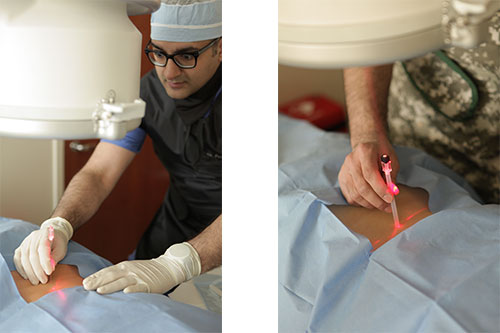-
-

Spine Treatments include
- Caudal Steroid Injection
- Epidural Steroid Injections
- Facet Injections
- Percutaneous Disc Decompression
- Radiofrequency Ablation
- Trigger Point Injections
Diagnositc
- Medial Branch Block
- Provocative Discography
Ignoring your back pain will increase the likelihood of poor outcomes. Early intervention is KEY. Prolonged radicular pain can develop into muscle weakness and impaired functioning.
At Modern Pain Consultants, we offer patients innovative and minimally invasive spinal treatments. Procedures such as epidural steroid injections and radiofrequency ablation have been tested and proven to be highly effective time and time again. These procedures can reduce pain without the risk of surgery!
Epidural Steroid injections
Epidural steroid injections are preformed for the treatment of spinal pain with or without radiating pain. By injecting a steroid (anti-inflammatory medication) into the epidural space, the medication can directly reduce the inflamed source of your pain, typically an inflamed nerve root. In addition to the steroid medication, an anesthetic can also be injected to immediately decrease pain. Some patients may experience pain relief with a single injection or repeated injections may be required. The procedure typically takes less than 5 minutes.
Types of Epidural Injections
- Cervical indicated for pain in the neck or upper extremities
- Thoracic indicated for mid-back or abdominal pains
- Lumbar indicated for low back pain or lower extremity pain
- Caudal indicated for low back, sacral, tailbone, or lower extremity pain
Epidural Steroid injections are approved for the treatment of:
- Radiculopathy
- Sciatica
- Herniated disc
- Spinal Stenosis
- Degenerative disc disease
- Intraspinal cysts
- Spondylysis
- Post laminectomy syndrome
Epidural steroid injection treatments are considered safe, effective, and routine care for spinal pain. Majority of patients will experience immediate relief following treatment, and will return to normal daily activities. Epidural steroid injections have been proven to assist patients in participating in physical and occupation therapy.
-
Radiofrequency Ablation (RFA)
Radiofrequnecy ablation is a procedure to treat spinal pain and multiple neuropathic disorders. Radiofrequency ablation utilizes a controlled electrical current to create a heat lesion onto a nerve to interrupt the pain signal to the brain, thus eliminating or reducing pain.
RFA is most commonly utilized for the treatment of chronic spinal pain originating from arthritic facet joints. Before RFA is performed, a patient must first have two successful diagnostic medial branch blocks.
Medial Branch Blocks (MMB)
MMB are performed to diagnose facet arthopathy. MBB are an injection of anesthetic medication into the medial branch nerves. The medial branch nerves provide sensation to facet joints of the spinal column that send the pain signal to the brain. The facet joints connect the vertebrea to one another and are responsible for the mobility of the spine. These joints can become arthritic and become a significant pain generator. A successful MBB will provide a patient with a significant reduction of spinal pain, thus confirming their facet arthritis diagnosis.
Radiofrequency ablation is utilized to provide long-term relief (6 to 18 months) in managing chronic spinal pain. This treatment is performed under conscious sedation and typically takes less than 30 minutes.
Radiofrequency Ablation is approved for:
- Spinal arthritis
- Spondylosis
- Peripheral Neuropathies
- Complex regional Pain Syndrome
- Neck Pain
- Back Pain
- Facial Pain
- Extremity pain
- Post Herpetic Syndrome/Post Shingles
Trigger Point Injections
Trigger Point Injections are approved for the treatment of painful, tight, and tender muscles. Medication injected with trigger point injections can include local anesthetics and potent anti-inflammatory drugs. Trigger point injections are implemented for multiple pain conditions with associated muscular complaints.
Provocative Discography
Provocative Discography is a diagnostic procedure to identify which discs of the spine are responsible for patient’s spinal pain. A discogram is an invasive procedure where contrast solution is injected into the disc to determine if the chronic pain pattern is induced. If the pain experienced is similar to its chronic presentation, then the source of pain will be identified. The process is repeated on two additional levels for comparison. A CT scan then follows the test.
To REDUCE procedure risk, all spinal procedures are performed by our physicians under fluoroscopic guidance to ensure proper needle placement and visualization of medication administered.
OVERALL goals of spinal interventions include a diminished pain level, improved activity tolerance, and reduction in medication needed.
If you are experiencing chronic or acute spinal pain- DO NOT HESITATE- THE TIME IS NOW. Immediate appointments are available, but space is limit.
-


